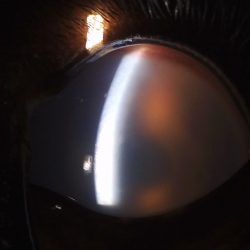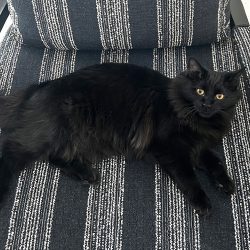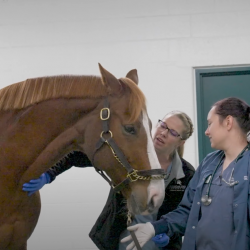History and Diagnosis
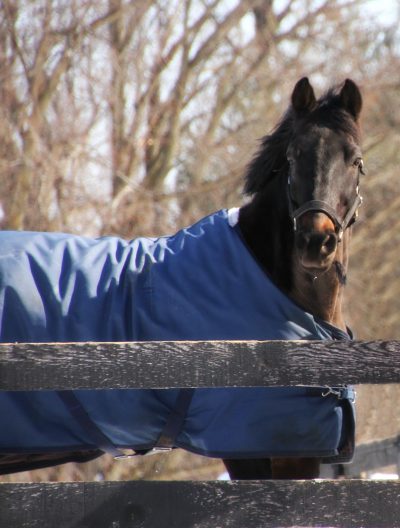
Saumur is a 22-year-old Morgan gelding who presented to the MSU Veterinary Medical Center (VMC) Equine Emergency Service for evaluation and treatment of a severe episode of colic that was not responsive to medical management on the farm. Saumur was found on the morning of presentation down in lateral recumbency in his stall, seeming very uncomfortable. Saumur’s owners immediately called their regular veterinarian out to the farm. He was treated medically but did not respond to treatment and remained in consistent pain, even in the face of analgesics. He was then referred to the MSU VMC for further evaluation and treatment.
At the MSU VMC, Saumur presented down in the trailer in extreme pain. Once safely unloaded, he was brought into the hospital for immediate evaluation and treatment. He was given heavy doses of sedation prior to physical exam, as he was displaying violent signs of colic. Physical exam revealed poor blood pressure, elevated heart rate, and no gut sounds. Distended loops of small intestine could be palpated rectally and seen on abdominal ultrasound. An abdominocentesis was performed and analysis of this fluid showed the likelihood that he had a small intestinal strangulating lesion that would require surgery. After a quick and thorough discussion with the owners, the decision was made to prep Saumur for an emergency abdominal exploratory surgery.
Treatment and Outcome
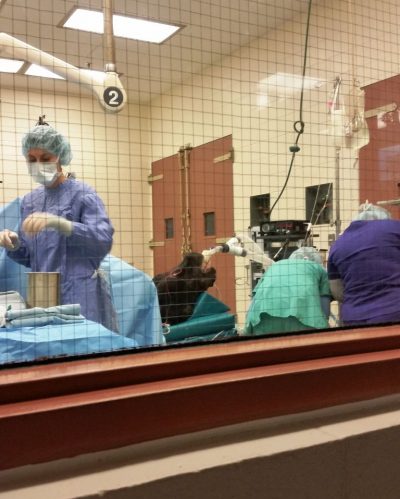
Saumur was initially evaluated and subsequently managed in the hospital by Drs. Hal Schott and Lisanne Gallant. His surgery was performed by surgeons Drs. Marc Kinsley and Jarrod Troy. During surgery, a lipoma was found strangulating the ileum. No devitalized tissue was found and the lipoma was removed. The rest of the gastrointestinal tract was evaluated and there were no other abnormal findings. Saumur then stood and recovered from surgery uneventfully.
Saumur was moved to a stall and immediately put on IV fluid support, as well as a pain management protocol tailored specifically for him. At approximately 2:00 a.m. that first night, Saumur became mildly uncomfortable and displayed an increased heart rate. Our experienced veterinary technicians recognized something was wrong and Saumur’s resident was called in to evaluate him. A nasogastric tube was passed and 16L of net reflux was obtained. This is a phenomenon we refer to as post-operative ileus. This can be a complication following colic surgery of any kind, more specifically a surgery involving the small intestine.
Over the next 24 hours, Saumur’s IV fluid therapy was closely monitored to ensure we were maintaining hydration and adequate electrolyte balances, as he was continuously losing fluid through his nasogastric tube. After 24 hours, his small intestine started moving again, and Saumur was able to pass fluid on his own rather than filling up his stomach. His nasogastric tube was pulled and he was very cautiously re-fed over the next 3-4 days.
The rest of Saumur’s post-operative recovery period went very smoothly. The VMC’s dedicated and caring staff worked around the clock to ensure no further complications would arise during his recovery. He was eventually weaned off IV fluid therapy and was discharged to go home once he was able to handle full feed and was passing normal manure.
Comments
The type of lesion Saumur experienced is life threatening. If the bowel’s blood supply is cut off for any period of time, the tissue immediately begins to die and often needs to be resected during surgery. Saumur was incredibly lucky to have such an attentive owner and veterinarian at home that he was immediately rushed to the MSU VMC before the strangulating lesion could do further damage. Minutes matter in these cases and Saumur’s post-operative recovery would have been much longer and much more complicated if part of his bowel had been allowed to die.
Once Saumur arrived to the MSU VMC, our experienced team immediately recognized the emergency of the situation and was able to perform the life-saving surgery Saumur needed. The MSU Veterinary Medical Center has board certified specialist veterinarians, veterinary students, and licensed veterinary technicians that are available 24 hours a day for the intensive care that Saumur required.

